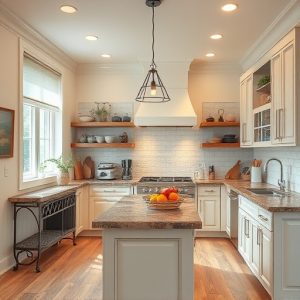Kitchen renovations today encompass more than just aesthetic upgrades; they involve strategic planning to enhance functionality, integrate smart technology for convenience and efficiency, and incorporate sustainable materials to minimize environmental impact. Homeowners are advised to assess their current kitchen layout and habits, considering the latest in energy-efficient appliances that offer smart capabilities like remote monitoring and voice control. These modern appliances not only align with smart home integration but also promote energy savings and cost reductions over time. Thoughtful design choices, such as maximizing storage and optimizing the work triangle for better movement flow, are crucial for an efficient kitchen space. Additionally, renovations should reflect individual lifestyles, with options like built-in coffee stations or double ovens for those who entertain frequently, or high-quality blenders for health-conscious individuals. The integration of smart appliance technology is not just a trend but a forward-thinking investment in a responsive and integrated kitchen environment. Furthermore, the use of recycled materials and low-VOC finishes emphasizes the commitment to sustainability within modern kitchen renovations, offering a blend of style, function, and environmental responsibility. The choice between professional installation or DIY for new appliances is significant, with professional services ensuring proper function, safety, and warranty coverage, while DIY offers cost savings and hands-on experience at the risk of potential errors and safety hazards. Kitchen renovations, therefore, are a comprehensive approach to updating one's kitchen, balancing design, technology, and sustainability with individual needs and preferences.
Kitchen renovations are not just about aesthetics; they’re a strategic upgrade to blend modern convenience with sustainable living. As appliances age, their efficiency often wanes, leading to increased energy consumption and less reliable performance. This article navigates the transition from outdated kitchen setups to contemporary, energy-efficient, and smart-integrated spaces. We’ll explore how replacing old appliances with upgraded models can enhance both your culinary experiences and your wallet, while also considering design elements that maximize functionality in a renovation. Additionally, we delve into the environmental impact of kitchen appliances, highlighting eco-friendly options that align with the green movement. Whether opting for professional installation or tackling a DIY project, this guide offers insights to ensure your kitchen transformation is as seamless and beneficial as possible.
- Assessing Your Current Kitchen Setup: Understanding Your Needs and Desires for Modern Convenience
- Energy-Efficient Upgrades: How New Appliances Save Money and Resources
- Smart Appliance Integration: Embracing Technology in the Kitchen for Greater Efficiency and Control
- Design Considerations for Maximizing Space and Functionality During Kitchen Renovations
- Sustainable Choices: Eco-Friendly Materials and Appliances for a Green Kitchen
- Professional Installation vs. DIY: Weighing Your Options for Kitchen Appliance Replacement
Assessing Your Current Kitchen Setup: Understanding Your Needs and Desires for Modern Convenience
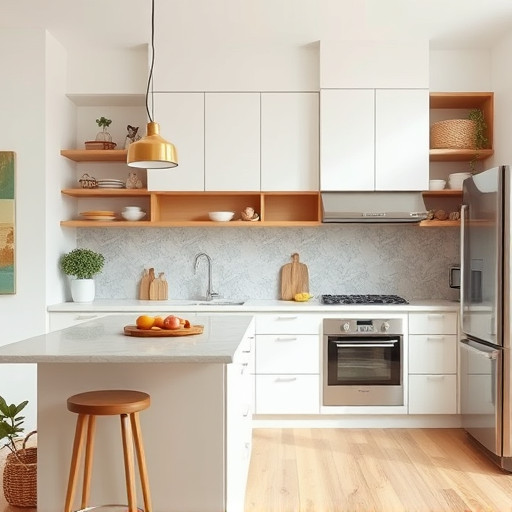
Kitchen renovations often focus on enhancing functionality, aesthetics, and integrating modern conveniences. As you evaluate your current kitchen setup, consider how your cooking habits, available space, and technological advancements influence your needs and desires for an upgraded kitchen. Assessing your appliances’ age, efficiency, and compatibility with smart home systems can reveal opportunities for improvement. For instance, if your refrigerator is over a decade old, it might be time to replace it with a model that offers better energy efficiency, more storage options, and even smart features like remote monitoring or voice control. Similarly, an older oven may lack the precision and speed of modern convection ovens, which can significantly streamline meal preparation.
When contemplating kitchen renovations, it’s not just about acquiring the latest gadgets but also about creating a space that aligns with your lifestyle. A thorough inventory of your current setup will help identify which appliances serve you well and where there are gaps. For example, if you entertain frequently, a built-in coffee station or a double oven might be worth considering. If you prioritize healthy eating, a high-quality blender or food processor could become the cornerstone of your kitchen upgrades. By understanding your specific needs and preferences, you can tailor your kitchen renovations to maximize modern convenience and enhance your daily cooking experience.
Energy-Efficient Upgrades: How New Appliances Save Money and Resources
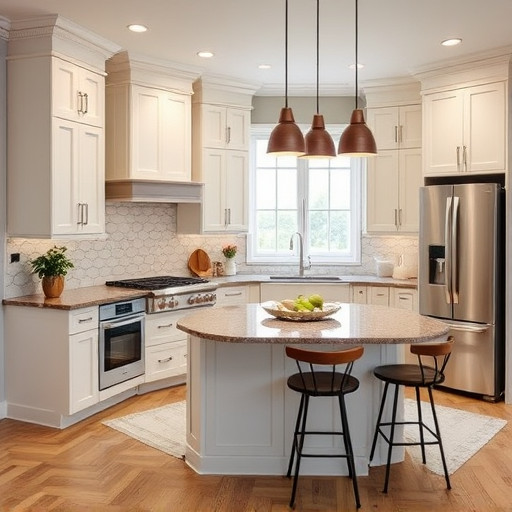
kitchen renovations often include the integration of energy-efficient appliances, a decision that pays dividends in both financial and environmental terms. Modern appliances are designed with advanced technology that optimizes energy consumption while maintaining peak performance. By replacing outdated models with Energy Star-rated refrigerators, ovens, dishwashers, and microwaves, homeowners can significantly reduce their electricity bills. These upgrades not only save money on utility costs but also contribute to a lower carbon footprint by decreasing the demand for non-renewable energy sources. The initial investment in energy-efficient kitchen appliances is offset by the long-term savings, making it a cost-effective choice for those looking to modernize their kitchens while embracing sustainable practices. Additionally, these appliances often come with smart features that allow for better energy management, further enhancing their efficiency and aligning them with the broader trend towards smarter, more sustainable living spaces as part of comprehensive kitchen renovations.
Smart Appliance Integration: Embracing Technology in the Kitchen for Greater Efficiency and Control
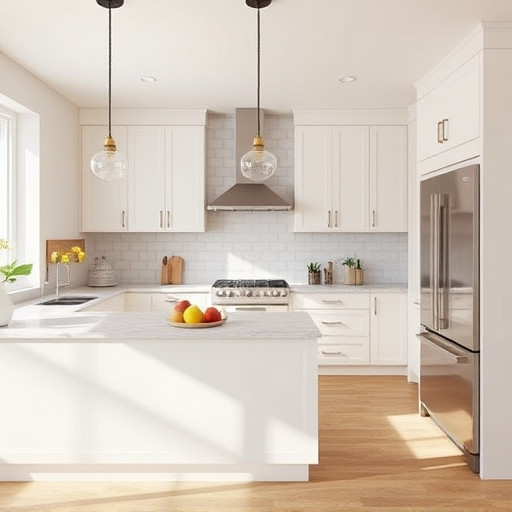
Kitchen renovations in the modern era often prioritize smart appliance integration, transforming the kitchen into a hub of efficiency and control. The advent of IoT-enabled devices has revolutionized how we interact with our kitchen appliances. Homeowners can now seamlessly integrate their refrigerators, ovens, dishwashers, and more, into a network that communicates and learns from user preferences and behaviors. This integration not only streamlines daily tasks but also provides homeowners with greater insight into their energy usage, allowing for smarter, more cost-effective choices.
Smart appliances can be programmed to operate at off-peak hours, reducing electricity costs and strain on the electrical grid. They offer remote monitoring and control via smartphones or voice commands, enabling users to preheat ovens, adjust refrigerator temperatures, or start a load of laundry without being physically present in the kitchen. This level of connectivity and automation not only enhances convenience but also elevates the kitchen from merely a place for food preparation to a central control station for household operations. As such, kitchen renovations that incorporate smart appliance technology are not just about modern convenience; they represent an investment in a more connected, efficient, and responsive living environment.
Design Considerations for Maximizing Space and Functionality During Kitchen Renovations
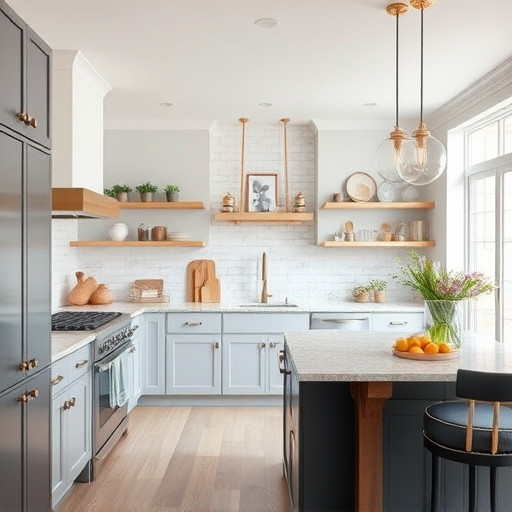
When planning kitchen renovations, design considerations for maximizing space and functionality are paramount to create an efficient and aesthetically pleasing environment. Optimal layouts should be prioritized, with a focus on the work triangle—the path between the stove, sink, and refrigerator—to ensure smooth movement and ample counter space. Cabinetry that reaches the ceiling can maximize storage without compromising floor space, while open shelving can serve as both display and easily accessible storage for frequently used items.
Incorporating smart appliances during kitchen renovations not only aligns with modern convenience but also enhances functionality. Consider appliance size in relation to available space; compact versions of full-sized appliances are available for smaller kitchens. Built-in appliances with handleless designs can contribute to a streamlined look and save valuable room on the countertops, allowing for more usable space. Additionally, integrating technology such as touch controls and app connectivity into your appliances can future-proof your kitchen, ensuring it adapts to changing needs without the need for immediate renovations. Choosing the right appliances with smart features can also help in managing energy consumption effectively, contributing to both efficiency and cost savings in the long run.
Sustainable Choices: Eco-Friendly Materials and Appliances for a Green Kitchen
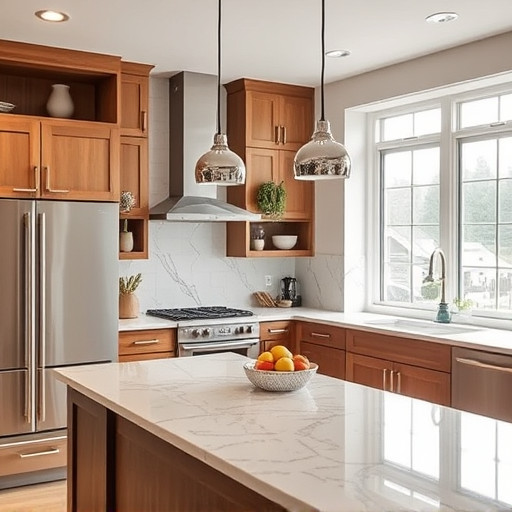
Kitchen renovations today often prioritize sustainability, integrating eco-friendly materials and energy-efficient appliances to create a green kitchen that benefits both the environment and homeowners. The selection of sustainable building materials is crucial in this endeavor; options like recycled glass countertops and bamboo flooring not only offer durability but also reduce the carbon footprint associated with their production and installation. These materials, as well as low-VOC (volatile organic compound) paints and finishes, contribute to better indoor air quality, ensuring a healthier living space.
In parallel with material choices, energy-efficient appliances are becoming the standard in modern kitchen renovations. These appliances, which include dishwashers, refrigerators, and ovens designed with green technology, consume less electricity and water than their traditional counterparts. By incorporating smart technology features such as energy-saving modes and LED lighting, these appliances further enhance the eco-friendly nature of the kitchen. Homeowners looking to upgrade their kitchens can significantly reduce their energy consumption and environmental impact while still achieving the modern convenience they desire. These upgrades not only align with the growing trend towards sustainability but also offer long-term savings and a reduced ecological footprint.
Professional Installation vs. DIY: Weighing Your Options for Kitchen Appliance Replacement
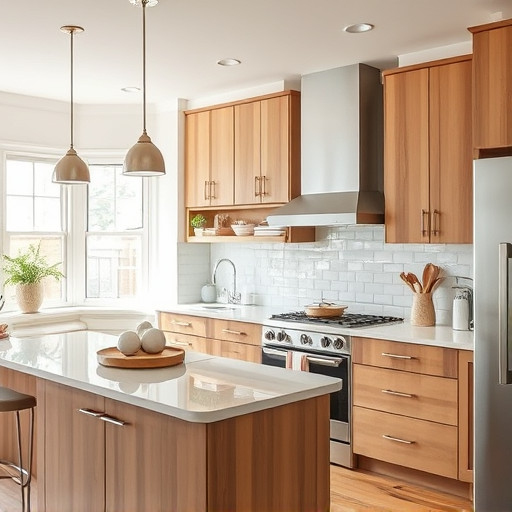
When embarking on kitchen renovations, replacing old or malfunctioning appliances with modern, energy-efficient models can significantly enhance both functionality and aesthetics. Homeowners at the crossroads of this decision must consider whether to opt for professional installation or undertake a do-it-yourself (DIY) approach. Professional installation offers several advantages, particularly in terms of expertise and warranty adherence. Certified technicians bring a level of skill and experience that ensures appliances are installed correctly, reducing the risk of future malfunctions or safety hazards. These experts can also help in aligning your appliance choices with your kitchen’s electrical and plumbing systems, avoiding potential issues that could arise from an improper fit. Moreover, choosing professional installation often preserves the manufacturer’s warranty, providing additional peace of mind. On the other hand, DIY enthusiasts may prefer to tackle the installation themselves to gain hands-on experience or to save on installation costs. While this approach can be rewarding and cost-effective, it requires a thorough understanding of your kitchen’s existing setup, as well as knowledge of local building codes and regulations. It’s crucial to accurately measure spaces, safely handle electrical connections, and properly align gas lines if applicable. For those without the necessary technical expertise, the potential for errors can lead to costly repairs or even compromise the safety of your home. Thus, when considering kitchen renovations that include appliance replacement, carefully weigh the pros and cons of professional installation versus a DIY project to determine which option best suits your skills, budget, and long-term goals for modern convenience and efficiency.
When contemplating kitchen renovations, the decision to replace and upgrade appliances is pivotal for modern convenience. This article has explored various aspects of this process, from assessing your current setup to embracing smart technology integration. Homeowners can reap the benefits of energy efficiency, reduce their carbon footprint with sustainable choices, and enhance both space and functionality in their kitchens. Whether opting for professional installation or considering a DIY approach, the transition to new appliances promises not only a more streamlined and efficient cooking environment but also significant savings on utility bills. In summary, upgrading your kitchen appliances as part of your renovation plan can modernize your space, provide smart solutions for daily tasks, and align with eco-friendly practices, all of which contribute to a more convenient and sustainable home.
